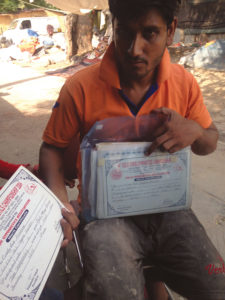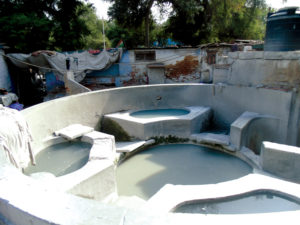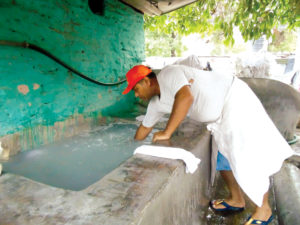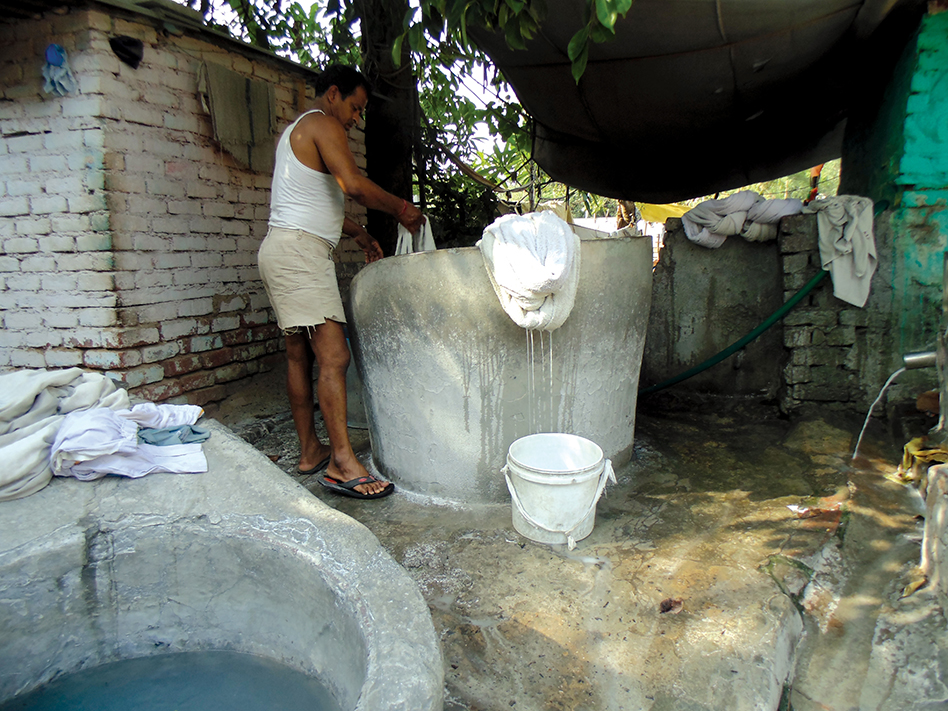A dhobi ghat right next to Connaught Place, built by the British in 1932, may soon be history as redevelopment wipes out a whole way of life
The residents of a dhobi ghat in the capital wait in suspense for what fate has in store for them. When will they be asked to leave? What will they do once they are evicted? What will happen to their livelihoods?
Built in 1932 by the British to get their clothes laundered, the structure still exists, and those living here still derive their income through it. But the rumour is that at any moment they may be asked to vacate their homes which sits on Central Public Works Department (CPWD) owned land.

One such person is Deepak Sharma. The 30-year-old was born here in Ghat No. 7 off Minto Road, and now has a child of his own. His grandparents moved to Delhi from Lahore during Partition. As he puts it, “They didn’t know where to live, and where not to.” By 1952, they had moved into the ghat where his grandfather started washing clothes and his grandmother hung them up to dry in the sun.
“My father then continued the work. They didn’t think about joining government service because they made good money with this”. If in 1980 a government job entailed pay of Rs 110 a month, Sharma says, with the laundry they earned Rs 1,500, adding that the other perk was it being their own private business.
His father continued this till 2008, when he died. Sharma was left to fend for himself and his two sisters, with his mother having passed away two years before his father. And so, he took over the work. By then his education had already suffered, he says, after he was thrown out from school.
He reveals later that he was an under-16 national level gymnast, who had just moved to the senior category when he had to abandon his promising career in sports. “I played in many states of the country. The first competition I took part in outside the state was in 1999 when I went to Madras.”

Deepak Sharma’s talent was first discovered when he was in 2nd grade. “I would take a bite of food and then do hand stands”, he says as we sit outside his home on a hot summer day.
The moment this innate skill got a chance to be built was when a superintendent of police in the railways came to use the STD booth outside his home. He was a coach at Indira Gandhi stadium, “and told my father that he should let me train”.
“My father would take me on his bicycle, drop me to the stadium and pick me up. I won many medals. I even made my passport in 2002 to go to Hungary but the sports authority demanded Rs 45,000. We couldn’t afford it”, Sharma says, showing his still brand-new looking passport tucked into a folder with all his certificates and newspaper clippings bearing his photographs.
He then goes on to tell us about why he left his studies. “When I was to start my 9th grade there was a championship in Hooghly district of West Bengal. The school principal refused to sign on the permission note so I put a false stamp and signature”, he tells us, laughing. Unfortunately for him, his friends told the authorities and he was eventually expelled. “I was not a good student and I was quite naughty”, he added, giving an excuse for why the principal refused to let him go for the competition.
Without a high school degree, his job prospects suffered. At 16, he was given the job of a sub-inspector in Roorkee for having won the bronze medal in Kolkata. But Sharma eventually left the job to try and get into the Air Force. “Selections were taking place but I didn’t know the qualification criteria was 10th grade, so I didn’t make it”.

With his studies affected, and then his father passing away, he says, still smiling, that nothing else could have been done. “I regret that I didn’t continue but I had responsibilities. When my father was alive, I never helped him. I was only interested in myself”.
Now he supports his wife, who was also a gymnast, and his son who studies in third grade, by ironing clothes from export companies. “I don’t get work often. Like today I have no work, tomorrow I will get some but there’s no steady income”. He describes his daily struggle with a quaint metaphor: “Every day we dig a well to drink from it”.
Although at first, he continued his father’s line of work, he couldn’t keep it up. The construction of buildings on CPWD land began, reportedly in September 2018, and a lot of space was taken away. This space crunch meant the business halved, as there was reduced space for drying clothes, and with it their income also halved.
The majority living here continue to work as launderers. Their clientele includes the railways, hotels and restaurants from Karol Bagh and Paharganj, a few hospitals, clothes from vendors in Janpath, and individual customers. During the winter season, their biggest clients are wedding bands.
The main ghat built in 1932 now has smaller ones sprouting on its sides and also machines by which clothes can be churned. But their work largely remains a long tedious method involving manual labour.
We met Kamal while he was washing towels from a hotel. The heavy smell of detergent and chemicals wafted in the air. Many processes are involved, each requiring physical strength.
Now in his 50s, he says his great grand-father was the first to pick up the job, moving in the same year it was built. “My family has lived here since before independence. The government did not look after us and now they are throwing us out as if we started living here only yesterday”, a miffed Kamal says.
The residents have been given an option to buy a 1-BHK flat by the Central government in Dwarka’s sector 14. According to them, persons belonging to SC had to pay Rs 32,000 and those belonging to the general category Rs 1,42,000.
But Kamal has not availed this offer. His wife Rakhi, answers why. “When we will not leave then what’s the point of buying it? No matter what, we will not leave.”
For the moment, Kamal goes about his work. Having started his day at 5 am, it will go on till 9 pm. “I keep working till work is there. If I refuse to do it then the customer will go to someone else, so we need to keep working. If it affects me, it affects my entire family,” he explains adding, “I’ll keep working till my hands can”.
Hema, another resident of the ghat, is one of those who are not engaged in laundry work. Her husband plies a rickshaw and she stays at home. Her three children are studying, one son in 9th and two girls in 7th and 4th grade.
The thing that worries her the most is her children’s education. “I don’t want their studies to suffer. If they ask us to move tomorrow will my kids get a seat in the government school there? Or will they have to drop a year?” she asks. Travelling from Dwarka to the schools they presently attend, Hema says, would be out of the question because of the costs involved, “I will not be able to afford the travel fare to bring my children to the schools here,” she adds.

Hema has only known this ghat as her home, having moved in as a 2-month-old baby with her grandparents. As we sit around, Sharma and Hema start talking about growing up together, the bond everyone in the ghat shares, something they will miss when they are made to move.





